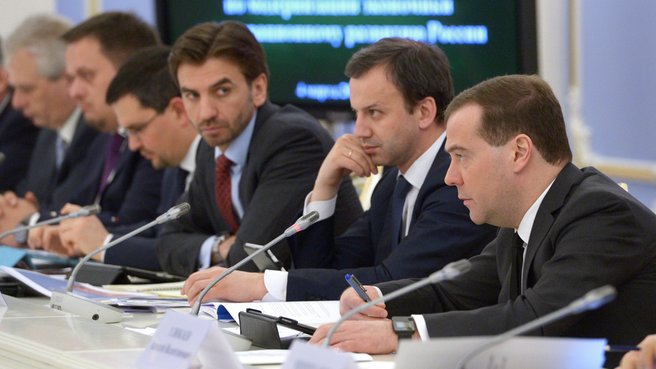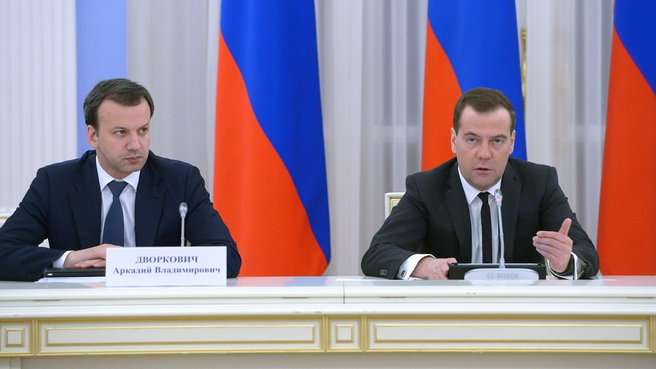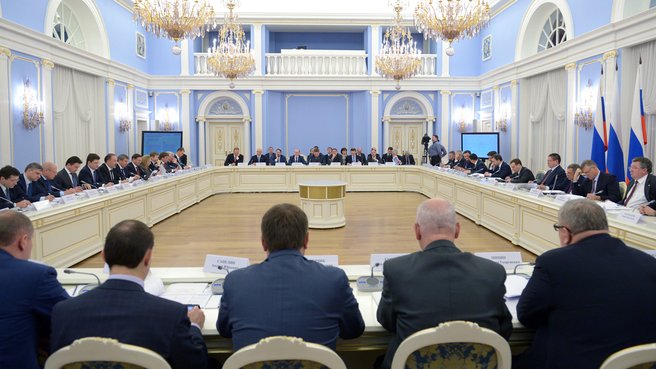Meeting of the Presidium of the Council for Economic Modernisation and Innovative Development.
Transcript:
Dmitry Medvedev: <…> Four months ago, a new ministry was established – the Ministry of Construction, Housing and Utilities. I hope that the organisational period is over and the new ministry will not only engage in its major activities, but also deal with key tasks concerning the industry’s innovative development and work towards reaching its targets.
In the past few years Russia has carried out a number of large construction projects – the World University Summer Games in Kazan, the APEC summit in Vladivostok, and the Olympic and Paralympic Winter Games in Sochi. These successful projects have demonstrated the potentialities of our construction complex.
Dmitry Medvedev: "In the past few years Russia has carried out a number of large construction projects – the World University Summer Games in Kazan, the APEC summit in Vladivostok, and the Olympic and Paralympic Winter Games in Sochi. These successful projects have demonstrated the potentialities of our construction complex."
Much has been accomplished recently for the development of industry science. Sound proposals have been made on enhancing the energy efficiency of construction, using composite materials and modern structures, including reinforced structures.
Development institutes (mostly Vnesheconombank and Rusnano, among others) have taken part in these activities. They have invested over 37 billion roubles in different projects at different stages – from R&D to modern production development. Some investment projects concern upgrading building capacity, but the situation leaves much to be desired in mass housing construction with rare exceptions. I’ll make three points.
Dmitry Medvedev: "Development institutes (mostly Vnesheconombank and Rusnano, among others) have taken part in these activities. They have invested over 37 billion roubles in different projects at different stages – from R&D to modern production development. Some investment projects concern upgrading building capacity, but the situation leaves much to be desired in mass housing construction with rare exceptions. I’ll make three points."
First, there is inadequate coordination between the main participants in the innovative cycle, starting from the state, business, self-regulating organisations, development institutes, and sectoral research, and educational centres. The new ministry has been called upon to coordinate this process while taking due account of the roadmap that we’ve recently endorsed on relevant issues – upgrading legal regulations in urban development and improving the business climate in construction.
Second, there is a fairly widespread contradiction arising at different stages of construction. To some extent, this is of an objective character. Innovations often imply huge expenses in terms of designing and building a project whereas the proceeds from its implementation are not so promising. Naturally, our clients want to spend less on construction and quality always depends on such factors.
Moreover, they want to save on building materials and this is absolutely justified in some cases, but it also creates a certain trend. Investment in such projects should thus be more eco-friendly, energy efficient and more resistant to wear and tear. This means higher expenses.
To conduct work on a systemic basis, it is necessary to update the strategy for the development of the building materials industry (adopted in 2011) and give a more detailed description of mechanisms encouraging the use of innovative technology.
Dmitry Medvedev: "The Ministry of Construction, the Ministry of Industry and Trade and national associations of self-regulating construction organisations should ensure Russian standards match European standards."
The third point is the eternal problem of regulations and technical documentation. There is progress in many areas, including composite materials, but the issue of standards and regulations does not keep up with technological developments.
This is not the first time when we have discussed the broader application of European rules or Euro codes. The Ministry of Construction, the Ministry of Industry and Trade and national associations of self-regulating construction organisations should ensure Russian standards match European standards.
Plans have been made to create about 20 national appendixes to Euro codes.
In general, the procedures for reviewing and approving innovative solutions should be made more open and understandable to all investors.
<…>













